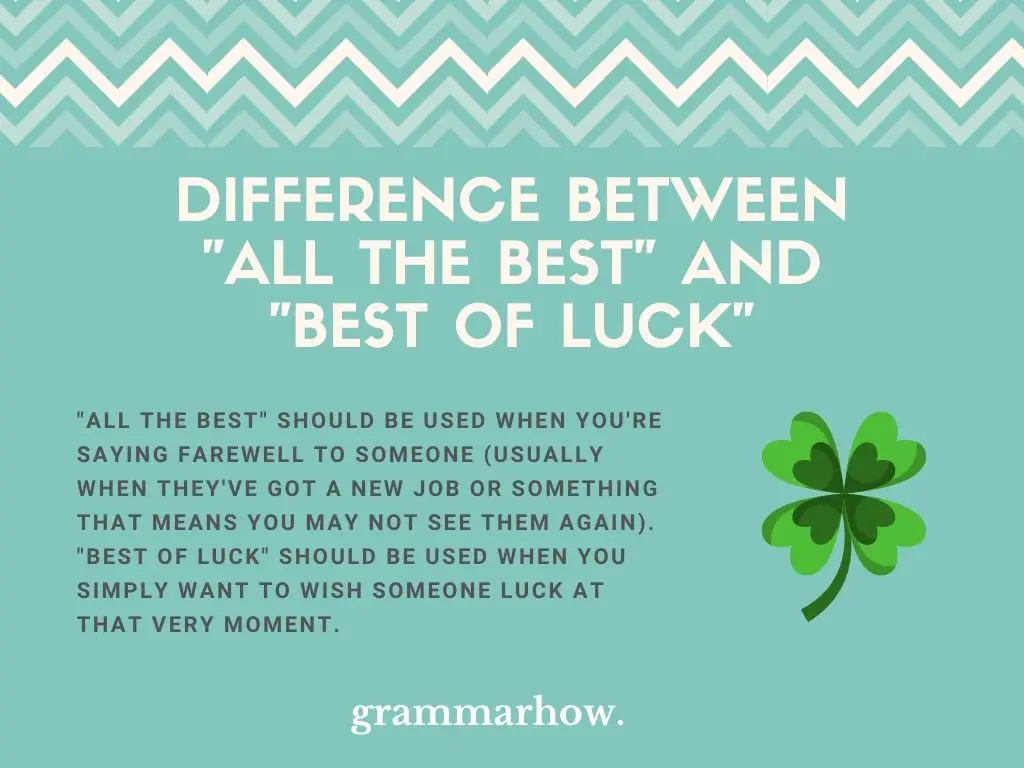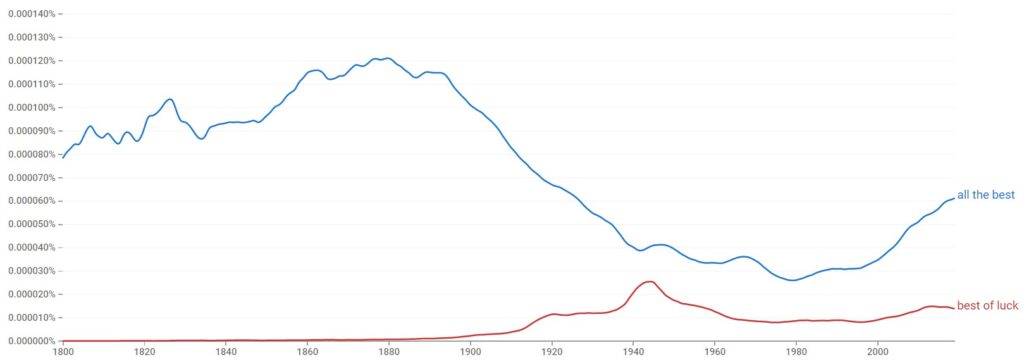Wishing someone luck is a friendly way to encourage someone to perform well at something. In this article, we’re looking at the more common ways to do it, like “all the best” and “best of luck” and the difference between them.
What Is The Difference Between “All The Best” And “Best Of Luck”?
“All the best” should be used when you’re saying farewell to someone (usually when they’ve got a new job or something that means you may not see them again). “Best of luck” should be used when you simply want to wish someone luck at that very moment.

The finality of the phrase “all the best” means it’s often reserved more for goodbyes than anything else. You’ll often see “good luck” cards for former employees with a new job signed with messages including “all the best.”
On the other side of that, “best of luck” isn’t a final goodbye. Usually, you can say it straight after you want to wish someone luck for something (like a sporting event or a large bet). After they’ve acted out the thing you wished them luck for, you return to normality.
It’s also worth mentioning that for most native speakers, there isn’t much of a noticeable difference. Whether you use American English or British English, most speakers aren’t going to tell you you’re using the wrong words if you use one in place of the other.
Is “All The Best” Or “Best Of Luck” Used The Most?
We thought it would make sense to include a comparison of the two in modern usage. You’ll also get to see how well they’ve performed in history to see how they work.
If you look at this graph, you can see that “all the best” is the more popular choice by quite a considerable margin. It’s also been the most popular choice in the last two centuries. “Best of luck” only seemed to be used after the 1900s.

Both phrases seem to be a truncated version of the same phrase:
- I wish you all the best of luck.
If we wanted to split this phrase down further, we’d end up finding both of the phrases inside it.
- I wish you (all the best) of luck.
- I wish you all the (best of luck).
For this reason, it’s not clear why “best of luck” only started to appear in the graph around the 1900s. However, it never really took off to quite the same extent as “all the best” did.
As we’ve mentioned previously, both phrases are interchangeable. You can use one over the other at any point, and no native speaker is going to ask you why you’re doing it. Just choose the one that works best for you.
7 Examples Of How To Use “All The Best” In A Sentence
While the two phrases are considered the same to most English users, we want to highlight the difference more apparently. We’ll run you through some examples of how to use the phrases in sentences to see the major differences.
“All the best” is used as a final goodbye. It’s expected that you wish someone luck with their future endeavors, but you might not get a chance to see them again to find out how they get on.
- I wish you all the best in your new field of study!
- Sorry to see you go, but all the best in your new job!
- From all of us here, all the best with whatever comes next!
- I wish you all the best with your future endeavors.
- All the best! Let me know how you get on if you get a spare minute in the future!
- All the best with your new role in the army!
- I honestly wish you all the best and hope I get the chance to see you again.
From these examples, we can see how “all the best” is seen as a more final farewell when we use it. It’s important to make this distinction, as we don’t often say “all the best” when we want to wish someone luck that we know we’ll see again.
For example, if someone was about to compete in an event, we wouldn’t want to say “all the best” because it seems like we’re saying goodbye. That’s why “best of luck” is better for those situations.
7 Examples Of How To Use “Best Of Luck” In A Sentence
Next, we’ll show you some examples of using “best of luck” in a sentence and how it’s used in a more general sense. Typically, we want to quickly wish someone luck before they take part in an event.
“Best of luck” is used in a more general way to wish someone luck. We want to encourage them to do well, but we know that we’ll see them again after the event to find out how it went (or we’ll be there watching them).
- Best of luck with your competition today!
- I wish you the best of luck with your interview!
- Best of luck at your new job, son! Let me know how your first day goes!
- Best of luck with that bet! That’s a lot of money you could win!
- Best of luck! You’re certainly going to need it!
- I think it’s time to say best of luck and let you focus on the competition!
- Best of luck and see you soon!
“Best of luck” is more common to find at the very start of the sentence. That’s because it doesn’t usually need a pronoun to announce it like “I” or “you.” “Best of luck” works well on its own and is even used as an exclamation in some cases.
Whenever we use it, you can see that we intend to see the person again afterward anyway. There isn’t a final goodbye associated with the phrase, meaning we only wish someone well for whatever the next thing for them is.
Is It Ever Correct To Use “All The Best Of Luck”?
We’ve mentioned earlier how the phrases both come from a longer phrase “I wish you all the best of luck.” That brings into question the idea of using “all the best of luck” as a phrase.
“All the best of luck” is correct to say, but it’s very rarely used in English. Most people either choose “all the best” or “best of luck” but never combine the two in such a way.
Does “Best Of Luck” And “All The Best” Mean Goodbye?
We’ve already explained most of the meanings behind the words, so hopefully, this part will be quite obvious to you!
“Best of luck” does not mean goodbye, but “all the best” generally does. However, both terms are also interchangeable, meaning you can use “best of luck” to say goodbye if you want to (or you could use “all the best” to wish someone luck for an upcoming event).
The typically expected meaning of each phrase means that only “all the best” is similar to goodbye.
Is It Rude To Say “Best Of Luck”?
If you’re ever worried about writing “best of luck” in any form, you don’t have to be. Thankfully, there aren’t many rules that come with wishing someone “best of luck,” so many people don’t think of it as rude.
“Best of luck” isn’t rude to say, though you might have better options in a formal setting. Most people use it all the time to wish someone well, so if you like the look of it, you can use it. No native speaker considers it rude (unless it’s used sarcastically).
Is “All The Best” Informal?
For the most part, we’ll see “all the best” in emails or farewell cards when people get a new job. That means that it’s most commonly found in the workplace.
“All the best” is not informal and works well in a business setting if you want to wish a former employee good luck in their future. You can also use it in casual settings. It works in both formal and informal settings.
4 Better Ways To Wish Someone All The Best
- Take care
- Good luck
- Break a leg
- Godspeed
The preferred way to wish someone all the best while also saying goodbye is “take care.” It’s a friendly way to say goodbye while making sure they look after themselves. It’s also used commonly in more formal settings, making it the perfect alternative.
Professional Wishes
Let’s go over some ways to use all the alternatives in a professional way. We won’t include “break a leg” or “Godspeed” because they’re only ever used as friendly wishes.
- Take care at your new job and let me know if you ever need anything.
- It was a pleasure working with you; good luck with your new job.
- Good luck with your new career.
Friendly Wishes
All of the phrases we mentioned are good as friendly wishes, so we’ll include them all.
- Take care and see you again soon!
- Good luck with your exams tomorrow, mate.
- Break a leg up there and show them what you’re made of!
- Godspeed to you! I believe in you!

Martin holds a Master’s degree in Finance and International Business. He has six years of experience in professional communication with clients, executives, and colleagues. Furthermore, he has teaching experience from Aarhus University. Martin has been featured as an expert in communication and teaching on Forbes and Shopify. Read more about Martin here.
